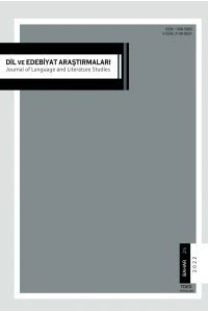Bir Yaz Gecesi Rüyası’nin Türkçe Çevirisinin Ekofeminist Bir İncelemes
ekofeminizm, uzam, toplum, doğa, erkek, kadın, ecofeminism, space, society, nature, men, women
An Ecofeminist Reading of the Turkish Translation Of A Midsummer Night’s Dream
ekofeminizm, uzam, toplum, doğa, erkek, kadın, ecofeminism, space, society, nature, men, women,
___
- Aksoy, N.Berrin (2002), Geçmişten Günümüze Yazın Çevirisi, Ankara: İmge Kitabevi.
- Bassnett, Susan (2002), Translation Studies, London and New York: Routledge.
- Boase-Beier, Jean (2011), A Critical Introduction to Translation Studies, London and New York: Continuum International Publishing Group.
- Callaghan, Dympna (ed.) (2000), A Feminist Companion to Shakespeare, Oxford: Blackwell Publishing.
- Cudworth, Erika (2005), Developing Ecofeminist Theory: The Complexity of Difference, Hampshire and New York: Palgrave Macmillan.
- D’Eaubonne, Françoise (2022), Feminism or Death, London: Verso Books.
- Derzelle, Iris (2021), “Françoise D’Eaubonne’s Ecofeminism”, Books and Ideas, Paris: Booksandideas, s. 1-11. Diamond, Catherine (2017), “Four Women in the Woods: An Ecofeminist Look at the Forest as Home”, Comparative Drama, c. 51 (1), s.71-100.
- Gaard, Greta (2017), Critical Ecofeminism, London: Lexington Books.
- Griffin, Susan (1978), Woman and Nature: The Roaring Inside Her, New York: Harper & Row.
- Kammer, Miriam (2018), “Breaking the Bounds of Domesticity: Ecofeminism and Nature Space in Love’s Labour’s Lost”, Shakespeare Bulletin, c. 36 (3), s. 467-483.
- Landers, Clifford E. (2001), Literary Translation A Practical Guide, Clevedon: Multilingual matters.
- Laroche, Rebecca and Munroe, Jennifer (2017), Shakespeare and Ecofeminist Theory, London: Bloomsbury Arden Shakespeare.
- Lauwers, Margot (2016), “Angles and ‘limes’ in American Studies: Ecofeminism in the research field”, Angles: New Perspectives on the Anglophone World, c. 3, s.1-15.
- Lefevere, André (ed. and trans.) (1977), Translating Literature: The German Tradition from Luther to Rosenzweig, Assen: Van Gorcum.
- Plumwood, Val (1993), Feminism and the Mastery of Nature, London: Routledge.
- Proudfoot, Richard (2001), Shakespeare: Text, Stage, and Canon, London: the Arden Shakespeare.
- Shakespeare, William (1998), Bir Yaz Gecesi Rüyası, B. Bozkurt, Trans. İstanbul: Remzi Kitabevi.
- Shakespeare, William (2010), A Midsummer Night’s Dream, J.R. Ford, Ed. Newburyport: Focus Publishing.
- Toury, Gideon (1995), Descriptive Translation Studies and Beyond, Amsterdam: John Benjamins Publishing Company.
- Venuti, Lawrence (1995), The Translator’s Invisibility: A History of Translation, London and New York: Routledge.
- Wiegmann, Mira (2003), The Staging and Transformation of Gender Archetypes in A Midsummer Night’s Dream, M. Butterfly, and Kiss of the Spider Woman, Lewiston: The Edwin Mellen Press.
- ISSN: 1308-5069
- Yayın Aralığı: 2
- Başlangıç: 2010
- Yayıncı: TÜRKİYE DİL VE EDEBİYAT DERNEĞİ
Müzik Terapiden Çalgılara Türkçe Acâibü’l- mahlûkât’larda Müzik
Bir Yaz Gecesi Rüyası’nin Türkçe Çevirisinin Ekofeminist Bir İncelemes
Roman Kişilerinin Gözünden Kudüs’e Bakmak: Kalbim Kudüs’te Kaldı
Üç Yolculuk Şiiri: “Han Duvarları”, “Yol Türküleri”, “Bir Otoyol Liriği”
Türkçede İrdelenmesi Gereken Bir Fiil: İrdelemek
Didem AKYILDIZ AY, Ezgi DEMİREL KAMANLI
